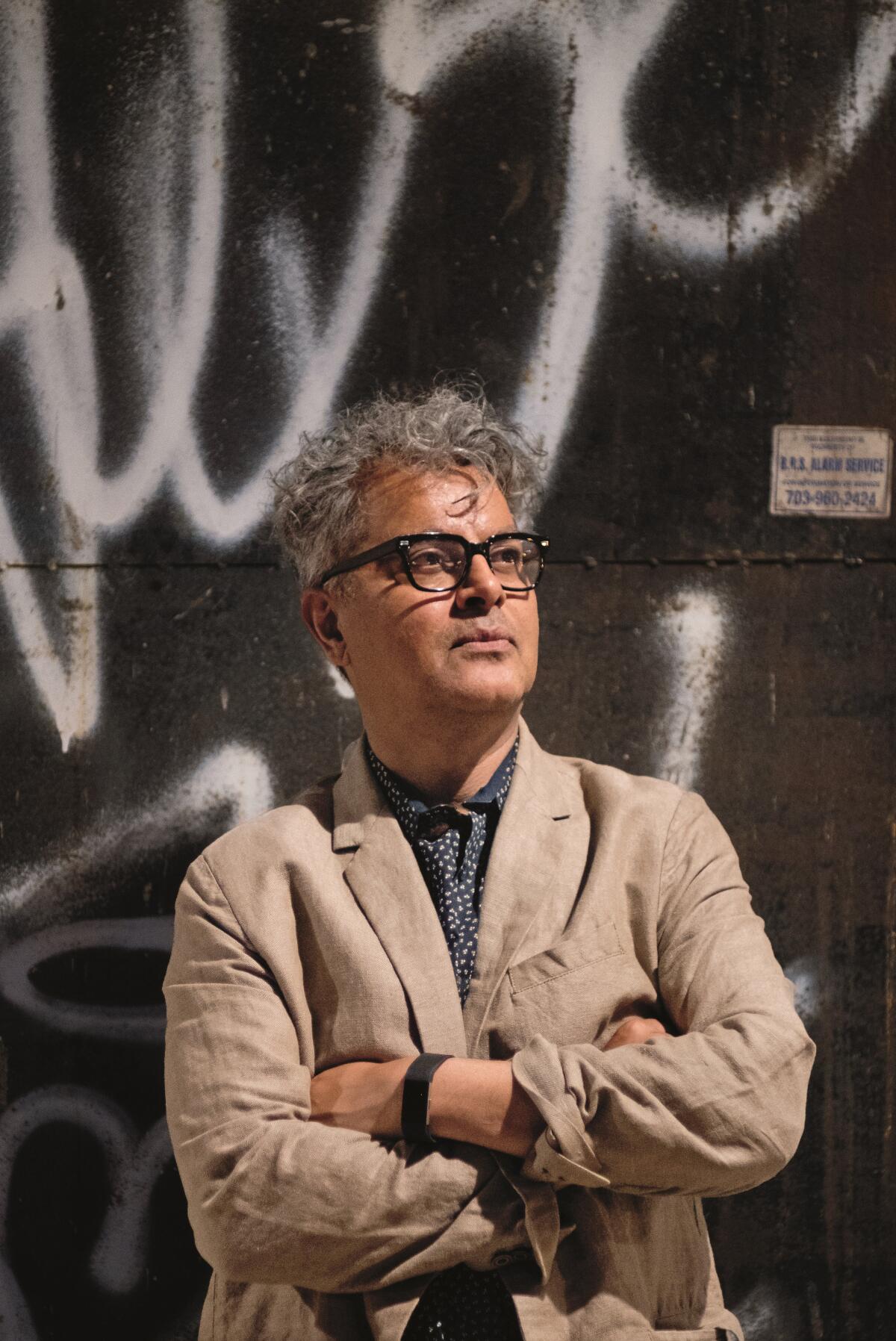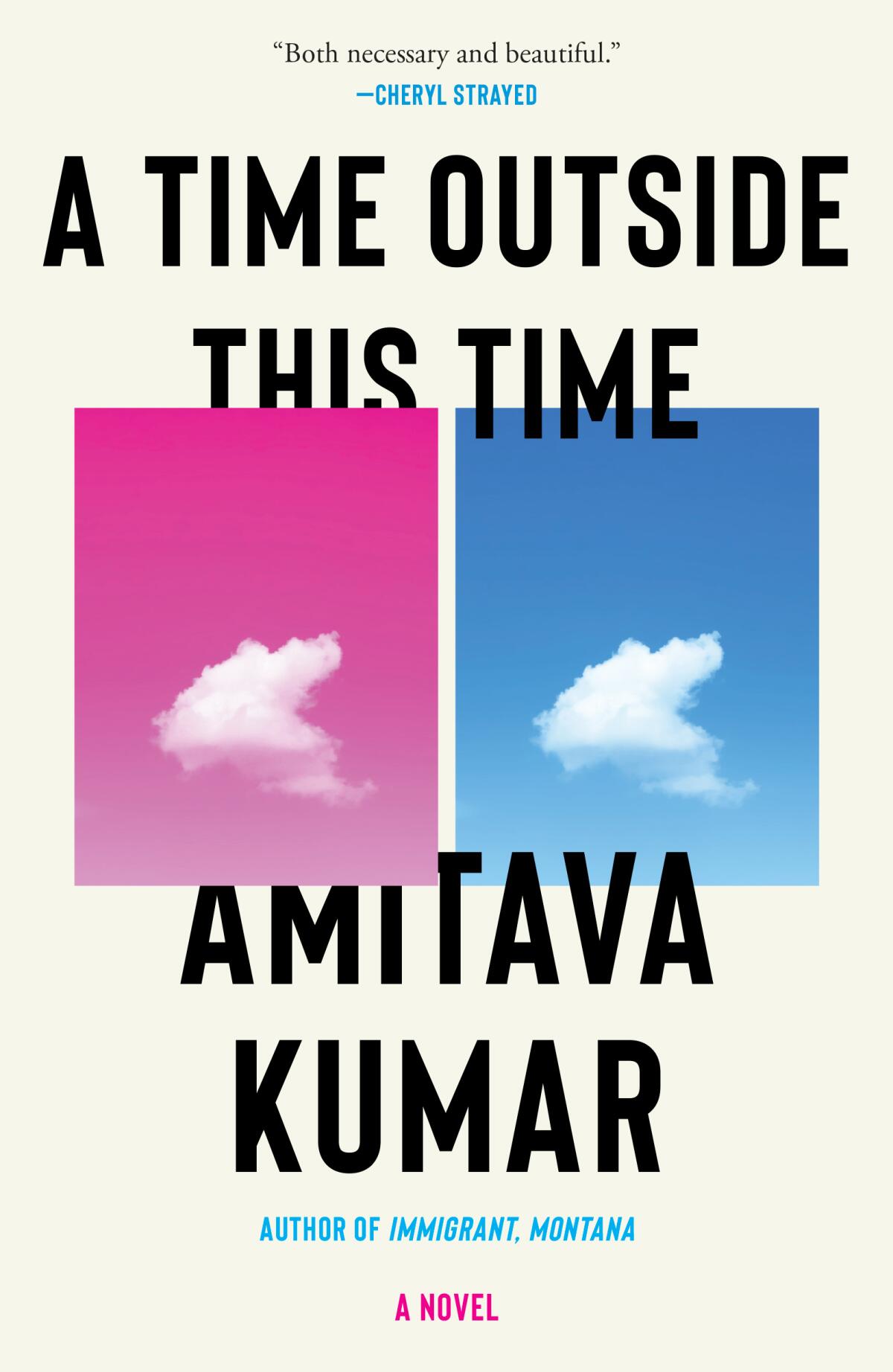A writer of true fictions on social media, fake news and ‘slow-jamming’ the world

- Share via
On the Shelf
A Time Outside This Time
By Amitava Kumar
Knopf: 272 pages, $27
If you buy books linked on our site, The Times may earn a commission from Bookshop.org, whose fees support independent bookstores.
Amitava Kumar’s new novel, “A Time Outside This Time,” often feels like something other than a novel. The narrator, Satya, is a professor and writer very much like Kumar, though we never get to read his new novel, “Enemies of the People,” “based on the many untrue stories that surround us and threaten to destroy us.”
Kumar’s book doesn’t quite fit into the booming category of autofiction, in which authors including Olivia Laing, Jenny Offill, Rachel Cusk and Karl Ove Knausgaard transfer their own lives — and often their own names — to autobiographical fiction.
It’s not just that Kumar differentiates his protagonist with a fictional name and fictional novels, but that he largely forsakes plot, spending more time melding journalism into his work. “Time” is suffused with his musings on where fiction fits into our brave new world of truth and lies. “I use what is called real life to craft my fiction,” he says. “How is it different from fake news?”
Kumar, 58, came from India in the 1980s as a student; he is the author of more than a dozen books, fiction and nonfiction, including the novel “Immigrant, Montana,” and an English professor at Vassar College.
“There’s a fraudulence to the traditional novel,” Kumar says. “So I share with the reader that there’s art in this artifice and vice versa. I was trying to make my writing feel as fresh as blood on a bandage.”
Ayad Akhtar, author of the new novel, “Homeland Elegies,” talks capitalism, Trump and literary tokenism with “Conditional Citizens” author Laila Lalami.
Satya is fictional but contemplates real events, from Donald Trump’s lies to killings in India. He also frequently cites experiments he has learned about from his wife, a psychologist.
“My editor said, ‘I want to meet your wife,’” Kumar says with a laugh. “But she’s not real. I’m married but not to Vanni.”
When Satya references Barack Obama quoting Ernest Hemingway and the importance of writing “one true sentence,” it’s both sincere and a feint. Even Kumar slips up during our video interview, saying, “I … Sorry, the narrator …” before admitting the line dividing them can feel quite fine at points.
One similarity between Kumar and Satya is clear: They agree that “A novel is better than the news.” He spoke with The Times about technology, Trump and truth; our conversation has been edited.

The lies and rumors, what you call “bad fiction” from governments, gains more traction through social media. How responsible is, say, Facebook, for the spread of these falsehoods and their consequences?
I quote a study that says whenever there’s a blackout and Facebook is not available there’s a lower possibility of riots taking place. And WhatsApp is a Facebook-owned company and dangerous rumors and political falsehoods are spread so quickly using WhatsApp in India. It’s the main purveyor of fake news.
I think we should hold these corporations accountable. Why has there not been a systematic interrogation of the norms that have determined that this app can become a conduit for murder — the very technology allowing me to see and talk to you right now could be responsible for us getting killed.
Is it just the technology or is it also human nature?
Social media does make things worse, but human nature is worse than social media. [Another cited study found] that bots spread fake news at the same rate as they do true news, but human beings spread fake news six times faster than true news. That’s astonishing. An MIT researcher wrote to me to explain, “Fake news is novel.” I’m like, “Yo man, that word is for what I do.”
Users around the world reported they were unable to access Facebook’s family of social-media apps, including Instagram and WhatsApp.
Much of your book recounts “true” — or at least real-life — incidents of ethnic or religious violence and government lies. The studies you cite are also real. Why did you feel you needed to mix journalism and fiction to get at the truth?
I read a novel by Olivia Laing called “Crudo.” While someone is getting married a character looks at their phone and says, “Steve Bannon has resigned.” I thought, “That’s the world we’re living in.” There’s a massive assault of information, the world is coming at you so fast and in such crazy ways that I must think about how we search for some sort of order in this chaos.
I hope my book inspires people to ask, “What is fiction?” and “Why are your lies and propaganda not fiction but this book is fiction?”
Your narrator tells the reader, “I cannot change your mind.” If you cannot change people’s minds, why write?
No, I can’t change your mind, but I want you to know that there is a book. The names and the stories of the dead are in here. Every one of those stories is real and they are written down and will not be forgotten. Writing allows me to keep a record that brings some order to this incredible chaos and allows us to remember, because it’s not just attention spans — it is memory being wiped out by a continuous deluge of information. Writing becomes a way for me to “slow-jam” the world.
Why is slowing things down important?
I forget the name of the person who was killed three days ago because I remember only the name of the person who was killed yesterday, and I will forget this guy’s name because tomorrow there will be another killing. My book becomes a way of remembering.
Can a novel at least help readers understand their own biases? Or are the people who are unwilling to open their minds not reading a novel like this anyway?
I cite an experiment in the book [in which] older people who were given plants to take care of did better and lived longer than those who were given plants but told the attendants would take care of them. It’s about being engaged or passive.
If people would write a log every day while they read this book, would the quality of their engagement change? Would we have slowed things down enough for them to think? And if they did that instead of passively watching fake news? In the spirit of the book, I do think it would work.
Annette Gordon-Reed, Ayad Akhtar, Héctor Tobar, Martha Minow, David Kaye and Jonathan Rauch discuss the Jan. 6 riot and what we do about it.
Tell me one true sentence.
[Laughs.] At the end of the book, I wrote, “A lot of life is left in a man being killed” before I tell the story of a man lynched in India. The first anniversary of a lynching was coming up and I thought I’d write something about him, just to remind people what happened.
The most depressing thing for me is watching these videos of Black men being killed by the police — or in India the lynching of people who are rumored to have eaten beef.
The sentence is about the human being erased in that moment.
More to Read
Sign up for our Book Club newsletter
Get the latest news, events and more from the Los Angeles Times Book Club, and help us get L.A. reading and talking.
You may occasionally receive promotional content from the Los Angeles Times.







